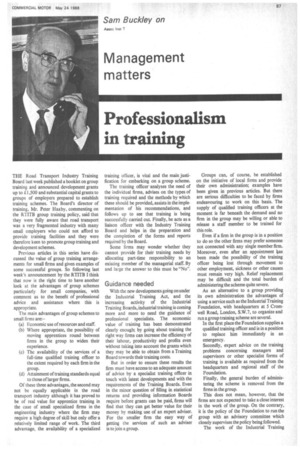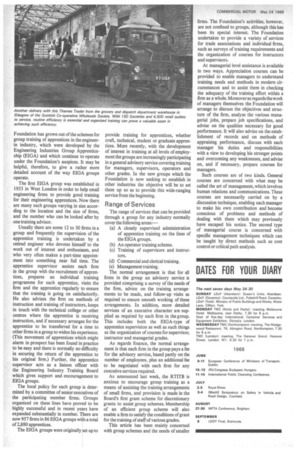Management matters
Page 89

Page 90

If you've noticed an error in this article please click here to report it so we can fix it.
Professionalism in training
THE Road Transport Industry Training Board last week published a booklet on group training and announced development grants up to £1,500 and substantial capital grants to groups of employers prepared to establish training schemes. The Board's director of training, Mr. Peter Haxby, commenting on the RTITB group training policy, said that they were fully aware that road transport was a very fragmented industry with many small employers who could not afford to provide training facilities and they were therefore keen to promote group training and development schemes.
Previous articles in this series have discussed the value of group training arrangements for small firms and given examples of some successful groups. So following last week's announcement by the RTITB I think that now is the right time to have another look at the advantages of group schemes particularly for small companies, with comment as to the benefit of professional advice and assistance where this is appropriate.
The main advantages of group schemes to small firms are:—
(a) Economic use of resources and staff.
(b) Where appropriate, the possibility of moving apprentices round between firms in the group to widen their experience.
(c) The availability of the services of a full-time qualified training officer to the extent required by each firm in the group.
(d) Attainment of training standards equal to those of larger firms.
Of these three advantages, the second may not be equally applicable in the road transport industry although it has proved to be of real value for apprentice training in the case of small specialized firms in the engineering industry where the firm may require a high degree of skill but only offer a relatively limited range of work. The third advantage, the availability of a specialized training officer, is vital and the main justification for embarking on a group scheme.
The training officer analyses the need of the individual firms, advises on the types of training required and the methods by which these should be provided, assists in the implementation of his recommendations, and follows up to see that training is being successfully carried out. Finally, he acts as a liaison officer with the Industry Training Board and helps in the preparation and the completion of the forms and reports required by the Board.
Some firms may wonder whether they cannot provide for their training needs by allocating part-time responsibility to an existing member of the managerial staff. By and large the answer to this must be "No".
Guidance needed
With the new developments going on under the Industrial Training Act, and the increasing activity of the Industrial Training Boards, industrial training is coming more and more to need the guidance of professional specialists. The economic value of training has been demonstrated clearly enough; by going about training the right way firms can increase the efficiency of their labour, productivity and profits even without taking into account the grants which they may be able to obtain from a Training Board towards their training costs.
But in order to ensure these results the firm must have access to an adequate amount of advice by a specialist training officer in touch with latest developments and with the requirements of the Training Boards. Even in the minor question of filling in statistical returns and providing information Boards require before grants can be paid, firms will find that they can get better value for their money by making use of an expert adviser. For the smaller firm the easy way of getting the services of such an adviser is to join a group. Groups can, of course, be established on the initiative of local firms and provide their own administration; examples have been given in previous articles. But there are serious difficulties to be faced by firms endeavouring to work on this basis. The supply of qualified training officers at the moment is far beneath the demand and no firm in the group may be willing or able to release a staff member to be trained for this role.
Even if a firm in the group is in a position to do so the other firms may prefer someone not connected with any single member firm. Moreover, even after an appointment 14.as been made the possibility of the training officer being lost through movement to other employment, sickness or other causes must remain very high. Relief replacement may be difficult and the total burden of administering the scheme quite severe.
As an alternative to a group providing its own administration the advantages of using a service such as the Industrial Training Foundation, with headquarters at 5 Cromwell Road, London, S.W.7, to organize and run a group training scheme are several.
In the first place the Foundation supplies a qualified training officer and is in a position to replace him immediately in an emergency.
Secondly, expert advice on the training problems concerning managers and supervisors or other specialist forms of training is available as required from the headquarters and regional staff of the Foundation.
Finally, the general burden of administering the scheme is removed from the firms in the group.
This does not mean, however, that the firms are not expected to take a close interest in the work of the group. On the contrary, it is the policy of the Foundation to run the group with an advisory committee which closely supervises the policy being followed.
The work of the Industrial Training Foundation has grown out of the schemes for group training of apprentices in the engineerin industry, which were developed by the Engineering Industries Group Apprenticeship (EIGA) and which continue to operate under the Foundation's auspices. It may be helpful, therefore, to give a rather more detailed account of the way EIGA groups operate.
The first EIGA group was established in 1953 in West London in order to help small engineering firms to provide good training for their engineering apprentices. Now there are many such groups varying in size according to the location and the size of firms, and the number who can be looked after by one training advisor.
Usually there are some 12 to 30 firms in a group and frequently the supervision of the apprentice training is undertaken by a retired engineer who devotes himself to the work out of interest and enthusiasm, and who very often makes a part-time appointment into something near full time. The apprentice supervisor assists each firm in the group with the recruitment of apprentices, prepares an individual training programme for each apprentice, visits the firm and the apprentice regularly to ensure that the training is going on satisfactorily. He also advises the firm on methods of instruction and training of instructors, keeps in touch with the technical college or other centres where the apprentice is receiving instruction, and if necessary arranges for the apprentice to be transferred for a time to other firms in a group to widen his experience. (This movement of apprentices which might alarm in prospect has been found in practice to be easy and there is normally no difficulty in securing the return of the apprentice to his original firm.) Further, the apprentice supervisor acts as a liaison officer with the Engineering Industry Training Board which gives support and encouragement to EIGA groups.
The local policy for each group is determined by a committee of senior executives of the participating member firms. Groups organized on these lines have proved to be highly successful and in recent years have expanded substantially in number. There are now 957 firms in 86 EIGA groups with a total of 2,880 apprentices.
The EIGA groups were originally set up to provide training for apprentices, whether craft, technical, student or graduate apprentices. More recently, with the development of interest in training at all levels of employment the groups are increasingly participating in a general advisory service covering training for managers, supervisors, operators and other grades. In the new groups which the Foundation is now seeking to establish in other industries the objective will be to set them up so as to provide this wide-ranging service from the beginning.
Range of Services The range of services that can be provided through a group for any industry normally cover the following areas:—
(a) A closely supervised administration of apprentice training on the lines of the EIGA groups.
(b) An operator training scheme.
(c) Training of supervisors and instructors.
(d) Commercial and clerical training.
(e) Management training.
The normal arrangement is that for all firms in the group an advisory service is provided comprising a survey of the needs of the firm, advice on the training arrangements to be made, and follow-up visits as required to ensure smooth working of these arrangements. In addition, more detailed services of an executive character are supplied as required by each firm in the group. This includes both the EIGA-type of apprentice supervision as well as such things as the organization of courses for supervisor, instructor and managerial grades.
As regards finance, the normal arrangement is that each firm in the group pays a fee for the advisory service, based partly on the number of employees, plus an additional fee to be negotiated with each firm for any executive services required.
As announced last week, the RTITB is anxious to encourage group training as a means of assisting the training arrangements of small firms, and provision is made in the Board's first grant scheme for discretionary grants to assist group schemes. Membership of an efficient group scheme will also enable a firm to satisfy the conditions of grant for the training of staff of various grades.
This article has been mainly concerned with group schemes and the needs of smaller firms. The Foundation's activities, however, are not confined to groups, although this has been its special interest. The Foundation undertakes to provide a variety of services for trade associations and individual firms, such as surveys of training requirements and the organization of courses for instructors and supervisors.
At managerial level assistance is available in two ways. Appreciation courses can be provided to enable managers to understand training needs and methods in modern circumstances and to assist them in checking the adequacy of the training effort within a firm as a whole. Moreover as regards the work of managers themselves the Foundation will arrange to discuss the objectives and structure of the firm, analyse the various managerial jobs, prepare job specifications, and advise on the qualities necessary for good performance. It will also advise on the establishment of records and on methods of appraising performance, discuss with each manager his duties and responsibilities with a view to developing his stronger points and overcoming any weaknesses, and advise on, and if necessary, prepare courses for managers.
Such courses are of two kinds. General courses are concerned with what may be called the art of management, which involves human relations and communications. These courses are necessarily carried on by a discussion technique, enabling each manager to make his own contribution and become conscious of problems and methods of dealing with them which may previously have escaped his notice. The second type of managerial course is concerned with specific management techniques which can be taught by direct methods such as cost control or critical path analysis.








































































































































